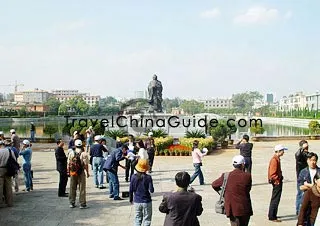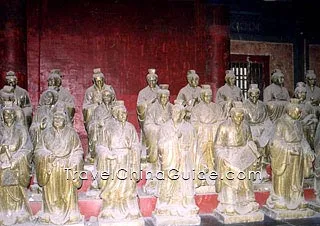Education in Zhou & Han Dynasties
Private School Thriving in the Spring and Autumn Period
 |
| Confucius Temple, Jianshui County, Yunnan |
Besides that, other schools such as Taoism, also taught widely and this led afterwards to 'a hundred schools of thought' in the Warring States Period. During the succeeding years, private schools continued to exist although there were times when state education became fashionable.
Recommendation through Observation in the Han Dynasty (206 BC - 220)
In 136 BC during the reign of Emperor Wudi (156 BC - 87 BC), the government introduced a system which was named 'taixue'. Usually the students were provided with a free diet and mainly studied the classical Confucian books. Following examinations, those with good marks would directly be given official titles.
 |
| Figurines of 72 disciples of Confucius |
The Nine Grades of Rank in the Regime System in the Jin, Northern and Southern Dynasties
The Nine Grades of Rank in the Regime System (or Jiupin zhongzheng system), employed the following method: in each state and county there was official acting as 'Zhongzheng' with authority to decide how people were ranked in the local precincts according to ability. By ranking candidates for official positions in this way, the government was able to make a choice of the best people for various posts.
Although it had no relationship originally with family background, the 'Zhongzheng' was himself invariably a member of the upper classes and he would often show partiality to families of dignitaries and other upper class people. Thus the disadvantages gradually became apparent and the system was abolished before long.
- Last updated on Aug. 07, 2025 by Gabby Li -